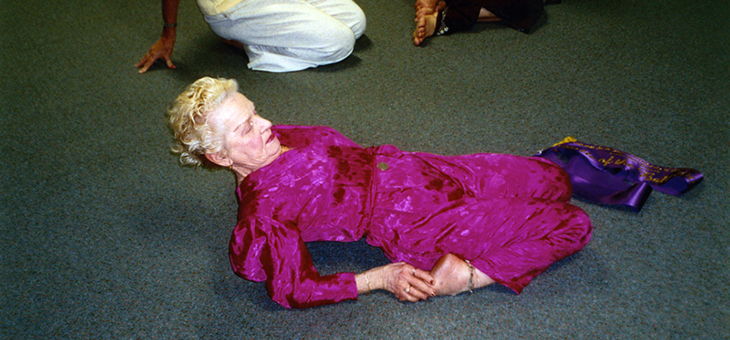Two Australian universities have discovered that yoga can significantly improve mental health and help maintain youthful agility in those aged over 60.
At the University of South Australia, a recent study found that movement-based yoga improves the mental health of people living with a range of mental disorders. And at Flinders University, researcher Associate Professor Kathy Arthurson discovered that yoga movements are an important means to help seniors maintain youthful agility.
Assoc. Prof. Arthurson, an expert in advocating mindfulness for improved health, has found inspiring results from studying yoga practitioners over the age of 60 and presents the evidence in her new book, Yoga Years: True Stories of How Yoga Transforms Ageing.
She is particularly inspired by such women as 95-year-old Tania Dyett in Wellington, New Zealand, one of 14 yoga teachers aged over 60 she interviewed for the research project about yoga and ageing, and which led to the publication of the book.
“When I attended Tania Dyett’s yoga class, I immediately knew what kind of older woman I want to be,” says Assoc. Prof. Arthurson.
“Aged 95, her wicked sense of humour made the class an absolute delight. We learnt her unique ‘my pussycat pose’, which involved ‘tail wagging’ and loads of laughter.”
Sadly, Ms Dyett recently passed away.
Assoc. Prof. Arthurson was equally surprised by 95-year-old Vivian Vieritz in Queensland, who performed her favourite pose – the headstand – during her interview.
“I was amazed at her strength and flexibility.”
Assoc. Prof. Arthurson says watching senior yoginis move their agile bodies through poses is a testament to the benefits of yoga for older people.
“Meeting them made me think that practising yoga keeps you young forever,” she says.
“I’m not talking about a lack of wrinkles and grey hair or looking like Cher or Madonna. The yoga women share a joy and vigour for life that belies their age.”
For the book, Ms Dyett shared her favourite pose – the reverse prayer – for a healthy spine, wrists and shoulders, to avoid developing kyphosis, an abnormal outward curvature of the upper back, thoracic vertebrae.
She said this pose helped her to continue playing the violin.
“Tania told me the body is like a musical instrument – you need to play it to keep it in good health.”
Lead researcher for the University of South Australia study Jacinta Brinsley said the findings regarding yoga and mental health were timely given the current restrictions on exercise options.
“As gyms and exercise classes of all kinds are now closed – even jogging with a friend is strongly discouraged – people are looking for alternatives, and this is where yoga can help,” Ms Brinsley said.
“Our research shows that movement-based yoga improved symptoms of depression (or improved mental health) for people living with a range of mental health conditions including anxiety, post-traumatic stress, and major depression. So, it’s very good news for people struggling in times of uncertainty.”
The research examined 19 studies (1080 participants) across six countries (US, India, Japan, China, Germany and Sweden), where individuals had a formal diagnosis of a mental disorder, including depression and anxiety.
The researchers defined movement-based yoga as any form of yoga where participants are physically active at least 50 per cent of the time, that is forms of yoga that emphasise holding poses and flowing through sequences of poses.
Assoc. Prof. Arthurson’s book underlines that yoga helps maintain floor-to-standing mobility.
A reduction in this ability for adults older than 50 is associated with earlier death and increased dependency.
Even simple mishaps for these people, like dropping reading glasses onto the floor, may pose a serious challenge.
In contrast, Assoc. Prof. Arthurson says she was astounded at how effortlessly the senior women yoga practitioners moved down onto the floor and back up again.
“Vivian told me to use it or lose it. She proudly said, ‘I don’t know of anyone else my age who is as healthy as me’.”
Practising yoga can help all people to maintain important movement capability – but it doesn’t have to be difficult. It can start by practising in a chair, and rising up and down from the chair.
“If you haven’t tried yoga before, don’t be put off by glossy pictures of yoginis in advanced practices or even seeing Vivian Vieritz in her headstand. Yoga is definitely not all about twisting the body into hard or bendy poses. There are many different styles and levels of yoga to choose from,” says Assoc. Prof. Arthurson.
“These yoginis maintain that any age is the right age to start yoga, because it will build flexibility, balance and strengthen muscles. Maybe, just like these women, you’ll still be practising yoga in your 90s.”
Have you tried yoga as a regular form of exercise? Does it help with your flexibility?
If you enjoy our content, don’t keep it to yourself. Share our free eNews with your friends and encourage them to sign up.
Related articles:
Fibre improves life expectancy: studies
Six deadly foods in your pantry
Talking can transmit virus: research

